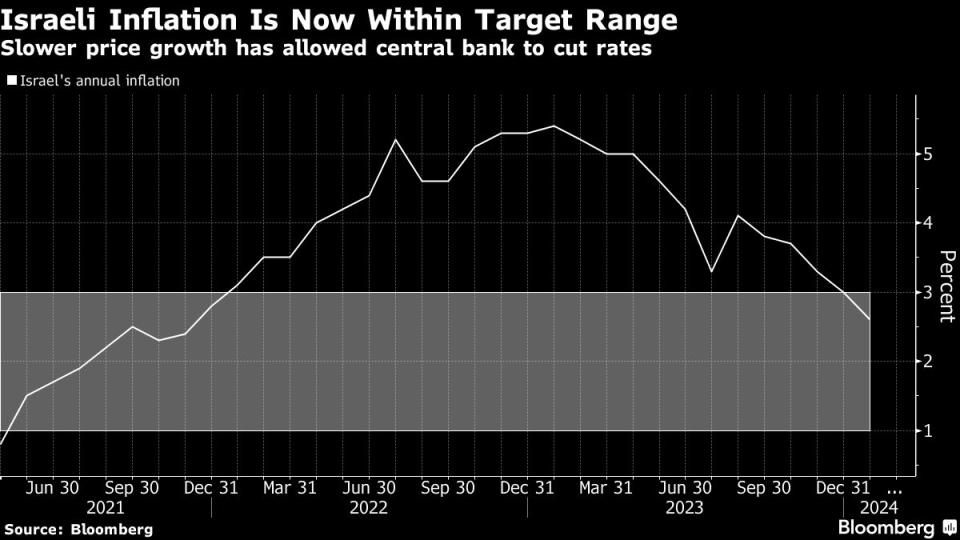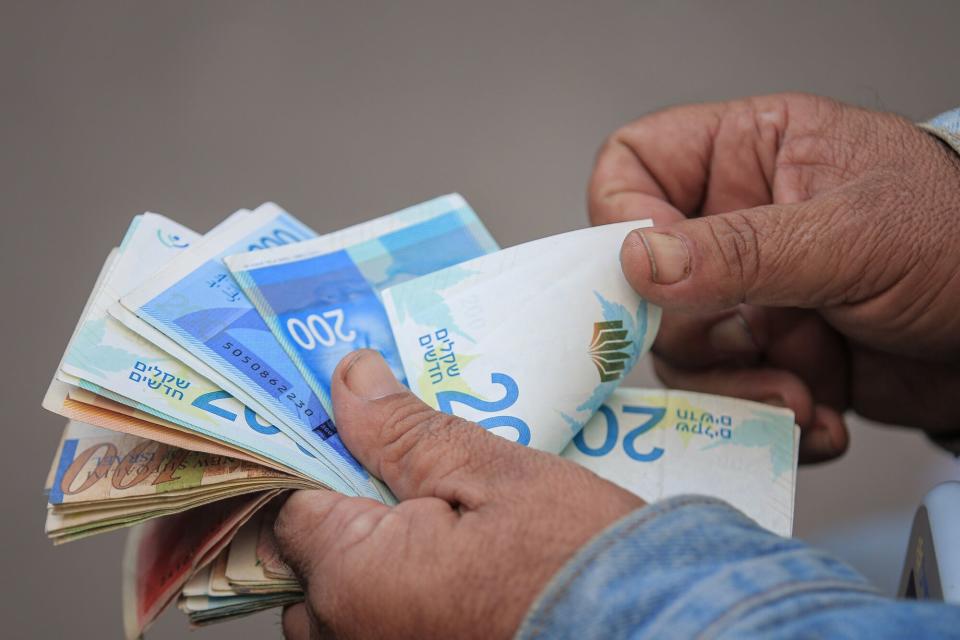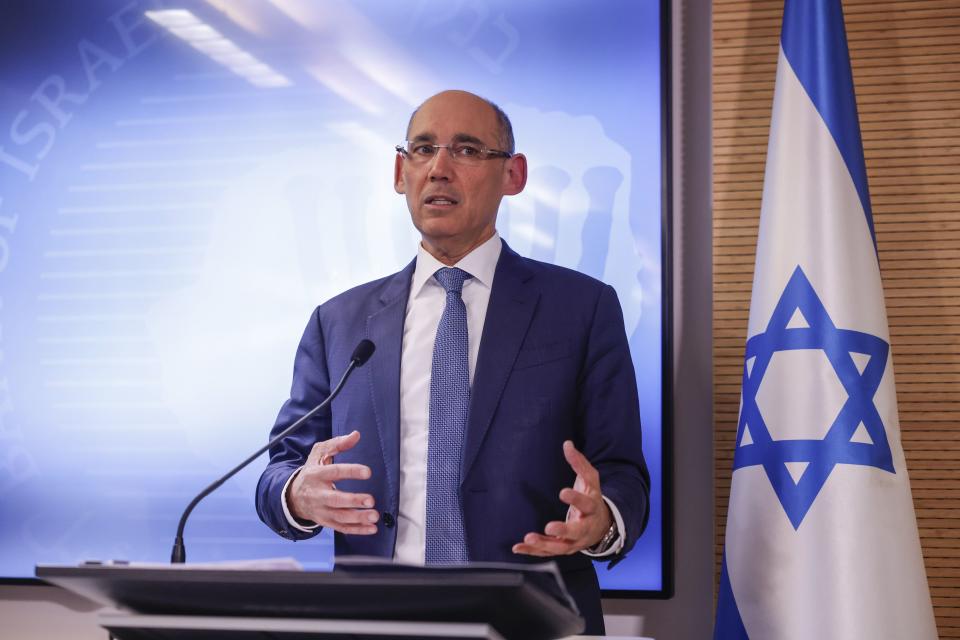Israel Halts Rate Cuts as Inflation Worry Stalks War Economy
(Bloomberg) -- Israel’s central bank left interest rates unchanged, opting against a second straight cut because of concern that inflation might accelerate again as the war against Hamas continues.
Most Read from Bloomberg
Apple to Wind Down Electric Car Effort After Decadelong Odyssey
A Spike in Heart Disease Deaths Since Covid Is Puzzling Scientists
Office Tower Deal for $1 Reveals Anxiety Among Longtime Buyers
Nvidia’s $70 Million Florida Supercomputer Hobbled by DeSantis Law
The monetary committee left the key rate at 4.5%, a surprise for most economists in a Bloomberg survey who had predicted a reduction of a quarter percentage point. The shekel pared losses after the announcement and closed little changed against the dollar.
Speaking after the decision in Jerusalem, Governor Amir Yaron made clear the central bank maintains an easing bias, saying it can continue with cuts if inflation stabilizes but wants to avoid the mistake of lowering rates too quickly.
“There is still uncertainty related to the impacts of the war on inflation processes,” he said. “It is important to continue to conduct responsible fiscal policy, and to broadcast this to the markets, which today are following the activity in Israel more than ever.”
A pause reflects the competing priorities pulling at policymakers as the war against Hamas approaches its sixth month. Though mindful of risks to the economy after a near-record contraction last quarter, the central bank has also warned that the government’s heavy spending in response to the conflict could be an obstacle to further monetary easing, in addition to concern over shekel volatility, geopolitics and credit rating downgrades.
Judging by the slowdown in price growth in recent months, ample room is available for the Bank of Israel to provide more stimulus. The Bank of Israel’s research department projects the interest rate at 3.75%-4% in the fourth quarter of 2024, an outlook that Yaron has said could imply as many as four cuts this year.
The central bank on Monday repeated its guidance from January, saying it’s “focusing on stabilizing the markets and reducing uncertainty, alongside price stability and supporting economic activity,” according to a statement accompanying the decision.
“There is a great amount of uncertainty with regard to the expected severity and duration of the war,” it said. “The Committee’s assessment is that there are still a number of risks of a potential acceleration in inflation.”
In Sync
By skipping a rate cut, Israel also aligns more closely with policies of global central banks.
US Federal Reserve officials have recently made clear they are in no rush to reduce rates. Several policymakers at the European Central Bank are stressing that monetary easing can’t begin until more data arrives in the coming months.
Relative calm has so far prevailed in Israeli markets, despite a downgrade earlier this month by Moody’s Investors Service, Israel’s first-ever sovereign rating cut.
Since that decision, the shekel has been the second-best performer among a basket of 31 major currencies tracked by Bloomberg, a rally helped by gains in global tech stocks. It’s trading at a level stronger than before the war, up more than 12% after reaching an 11-year low in late October.
Although Israel’s rate differential with the US shrank with a cut to start the year, its official borrowing costs are near 2% when adjusted for inflation, comparable to Canada’s and a bigger buffer than in developed economies from the UK to the eurozone.
Annual Israeli inflation was slowing or unchanged in all but one of the past 12 months, entering the government’s 1%-3% target range for the first time in over two years.
But a ramp-up in government spending is raising the risk of sticky inflation, especially if worker shortages endure, as higher shipping costs add to pressures.
The future course of the conflict presents the biggest uncertainty of all, highlighted by the threat that the fighting could spread along Israel’s northern border where its military has been exchanging fire with Iran-backed Hezbollah.
An economic slowdown at the end of last year also contrasts with signs of a quick rebound so far in 2024, especially in private consumption and a labor market that’s seen unemployment fall sharply since a spike in October. The Israeli Purchasing Managers’ Index in January shifted back into expansion from contraction, according to Bank Hapoalim.
Rate cuts are set to continue with a move to 4.25% in April, when an updated economic outlook by the central bank’s researchers will likely show “relatively moderate growth in 2024 and a considerable acceleration” the following year, according to Gil Bufman, Bank Leumi’s chief economist.
Goldman Sachs Group Inc. similarly expects “gradual rate cuts” to resume at the next meeting but sees “near-term risks skewed in the hawkish direction.”
“The reaction function of the central bank clearly remains more cautious against the backdrop of elevated uncertainty,” Goldman analysts Tadas Gedminas and Kevin Daly said in a report.
--With assistance from Joel Rinneby.
(Updates with Goldman comment in final two paragraphs.)
Most Read from Bloomberg Businessweek
Elon Musk’s Vegas Tunnel Project Has Been Racking Up Safety Violations
Transcript: Did Musk Buy Twitter to Keep His Movements Secret?
©2024 Bloomberg L.P.

 Yahoo News
Yahoo News 






